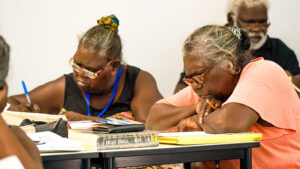For Yurranydjil, there is nothing more important than translating God’s word into heart languages, and she has been praying for years for God to provide other helpers in the work, so more may be done. “You know,” she says, “English is for the mind, but Yolŋu Matha is for the heart. And when we hear God’s word speak to us in the language that he has given us, it’s more precious, more valuable; it’s beautiful.” Coming from a multilingual kinship system, as do most Indigenous people, Yurranydjil expressed the hope that one day all Indigenous languages would have their own Bibles. “That would make God happy,” she said.
Yurranydjil and her husband Djawuṯ, who come from Galiwin’ku, Elcho Island community, are both graduates of Nungalinya College’s Diploma of Bible Translation. Years ago, Dr Jude Long began a conversation with Bible Society Australia’s Louise Sherman and Paul Eckert about Nungalinya College running formal training for Bible Translators, to be funded by various Bible Translation agencies in Australia. This came to fruition in the Diploma of Translating, supported by Bible Society Australia, Wycliffe Bible Translators, Coordinate (Uniting Church), AuSIL and the Anglican Diocese. The first 15 students studied for three years and graduated in 2021. Yurranydjil and Djawut were among these first students, who all travelled to Darwin from their homes for three-week lesson blocks over the three years. “It was good for me to learn those things and now I’m able to convey the teaching to new translators,” said Yurranydjil.
Since 1992, Yurranydjil has been involved in Bible translation, helping translate the New Testament into her mother’s language, Djambarrpuyngu, with the New Testament published in 2008. She also worked on the Gospel of Mark in her father’s language of Wangurri. When Yurranydjil was 12 years old she was told by a teacher that she would be a Bible translator. “I used to go along with my mother when she used to do Bible translation work, and sometimes I would say, ‘Mum, you should do it this way,’ and she would say, ‘No, don’t correct me, young lady. You’ll have your turn’. Diane Buchannan, the woman who worked with my mum said, ‘Yurranydjil, I guess that you should be doing this job also’. And I said, ‘No, no, no, I can’t do it, I’m not educated.’” When Yurranydjil did join the translation team, she remembered what they had said. “It’s a job that I really love doing. The number one priority is Bible translation work.”
Sandra Makurlngu, from Warruwi, Goulburn Island off the west coast of Arnhem Land, another graduate of the Diploma in 2021, expressed her thanks to all those who supported the diploma course. “You really helped us to come here and learn more about the Bible and how to translate it into our own language and do it properly, deeper, to make it clear, for our people to see the picture clear of how God is speaking to us in our own language today.”
 In 2023, Nungalinya began a brand new Certificate II in Indigenous Translating, with the first year’s topics including Language identity, reading, writing and punctuation in First Language and collecting Language resources. Principal, Ben Van Gelderen says, “The Diploma of Translating had a lot of good things about it, particularly if you were an experienced translator. But, the new course, which we designed ourselves from road-tested materials is at just the right level for new, aspiring Bible translators from remote Indigenous communities.”
In 2023, Nungalinya began a brand new Certificate II in Indigenous Translating, with the first year’s topics including Language identity, reading, writing and punctuation in First Language and collecting Language resources. Principal, Ben Van Gelderen says, “The Diploma of Translating had a lot of good things about it, particularly if you were an experienced translator. But, the new course, which we designed ourselves from road-tested materials is at just the right level for new, aspiring Bible translators from remote Indigenous communities.”
In 2023, 25 people were trained from two First Language cohorts: Murrinhpatha (Wadeye region) and from a number of the Yolŋu Languages of North-East Arnhem Land. They will finish their formal course in 2025, studying on how to translate with naturalness and accuracy. The translation courses at Nungalinya, Ben explains, are training people so they can go back home and carry on translation work, mostly Bible translation, but also kids’ resources, songs and more.
Ben notes that if any “Balanda” (white person) was interested in Bible translation, there would be opportunities to serve at Nungalinya in the future. “Bible translation works best when there’s a team in a community and in a Language, and often that involves a white fellow or Balanda person as well. So, for those who have those sorts of linguistic skills, and passion for translation work, you may not need to go overseas — you may need to come up here!”
“Nungalinya is so grateful for the partnership with Bible Society which enables us to teach this Certificate. Without BSA’s partnership we wouldn’t have a Bible translation course. It really is as simple as that, and it is a massive need.” Of the many Indigenous languages in the Northern Territory, Ben says there are about 15 strong languages, and “virtually everyone knows one of those. But there’s many, many more as well. So the language work really is just beginning.”